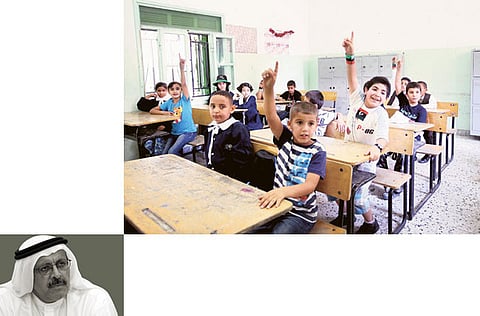Education key to progress
Arabs need to modernise curricula and prepare generations capable of restoring their position at the forefront of developed nations

Education has always been the key issue that concerns people who are fully aware of the importance of empowering generations with knowledge and technology to be able to build the future of their nation, in view of global changes.
Nations that have achieved progress in all areas never relied on depleting natural resources or on pride in their glorious past or illusions of superiority. Advanced nations were built on the shoulders of well educated and knowledge-oriented generations.
The Islamic nation’s great contributions to the world’s civilisation, education, culture and scientific development came as a result of its reliance on scientists and researchers.
This is why the Islamic civilisation is one of the greatest the world has known — the Islamic nation did not discriminate between its citizens on the basis of their ethnic or religious backgrounds.
Therefore, the Arab-Islamic civilisation left the door wide open for all sciences from all over the world, and thus Greek, Persian, Roman and Indian scientific works and writings were translated into Arabic. This move was followed by the translation of books by thousands of people who volunteered to do so at a time when there were no printing machines.
However, the Arabs entered into a period of stagnation spanning five decades when they were under Ottoman rule, before they restarted on their path to towards education.
The modern learning process is based on three key pillars: the student, the teacher and the school curriculum. Even if one pillar is missing, the learning process is incomplete.
Thus the UAE considered education fundamental to its development. Therefore, it opened schools and universities across the country and granted Emirati students scholarships to continue their education abroad so as to better serve their nation on their return.
It is noticeable that student interests differ from one emirate to another and from one social category to another, which lays emphasis on the importance of education as a security valve of society.
This is simply because suspending the learning process will lead to social, economic and probably political unrest. It will also lead to an increase in unemployment rates and crime, among other social problems. Social unrest has also led to an increase in the rate of immigrants from some Arab countries to other Arab states, as as well as to non-Arab countries.
Regretably, illiteracy rate in the Arab world is almost 55 per cent for females and 30-35 per cent for males, which is disturbingly high, especially after the spread of education and campaigns launched by some Arab countries to eradicate illiteracy.
This requires Arab countries to rise to the illiteracy challenge and to raise allocations for education, whereas spending on education does not exceed 6 per cent of the gross domestic product (GDP).
AS for the teacher who is the second pillar of the learning process: there is a lack of qualified teachers in most Arab countries. Qualified teachers are those who refrain from the traditional teaching method, which depends on memorisation only, not on enhancing creative and critical thinking.
Another thing is that the teacher no longer enjoys the respect and high position he used to have prior to the era of economic openness. And this has led to the emergence of the phenomenon of tutorials. Consequently, people are no longer interested in taking on the profession of teaching, which has lost its prestige and some of its ethics.
We need to restore people’s interest in this profession; the teacher should also regain respect of students. This can only happen when a new generation of teachers is empowered with knowledge and modern technology that allow him to earn the respect of others.
Nowadays, teachers seem to be less talented than their students in the use of the advanced technology and modern programmes as they are still holding onto the old teaching style at a time when the world is moving forward rapidly.
As for school curricula, this issue has been excessively discussed at many conferences and seminars. The problem is that when an important issue such as this is raised, some political forces try to interfere and impose their own political, social and economic agendas.
Therefore, curricula which are based on rote memorisation are no longer valid. Rote memorization is a practice of the past and modern teaching methods should be followed to encourage creative and critical thinking in students.
The Arab nation cannot move forward and catch up with advanced countries without developing education and abandoning all old teaching techniques.
Finally, change and development begin with education which must be updated in compliance with scientific advancements and global changes. We Arabs need to develop education and prepare generations capable of restoring our position at the forefront of developed nations and become effective partners in developing human civilisation.
Dr Mohammad Abdullah Al Mutawa is a professor at UAE University, Al Ain.



